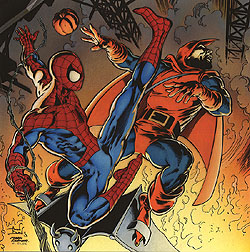 There's a large chunk of the anime audience that more or less ignores the theatrical films and focuses on the television shows. When Satoshi Kon followed up his three films with a 13-episode series, Paranoia Agent, I suspected it would bring much more attention to the director. I also remember thinking, "These people don't know what they're in for." I didn't really know what I was in for, either.
There's a large chunk of the anime audience that more or less ignores the theatrical films and focuses on the television shows. When Satoshi Kon followed up his three films with a 13-episode series, Paranoia Agent, I suspected it would bring much more attention to the director. I also remember thinking, "These people don't know what they're in for." I didn't really know what I was in for, either.After the classy Millennium Actress and the lighthearted Tokyo Godfathers, it took the first episode of the show to remind me just how dark and intense the director could be. Like all of the man's work, Paranoia Agent is truly excellent. With six-plus hours of content to work with, Kon and his crew weren't afraid to get really ambitious, in both form and content. It's the sharpest example of his social commentary, and the animation is worthy of a feature film. You won't find any of that cost-cutting laziness that made every Dragon Ball Z story arc about 15 episodes longer than it needed to be.
Tokyo residents are being attacked by a mysterious young phantom known as Shonen Bat, who wields a baseball bat and chases down his victims on roller skates. Two investigators, who have a Mulder/Scully-esque relationship pitting realism against possibility, struggle to connect the various incidents and their stange connection to Maromi, a garish pink dog who stars in the latest cartoon hit. Eventually, the public takes notice of the media attention and sympathy given to Shonen Bat's victims and starts to envy them.
 The series takes on an anthology format, using individual episodes to focus on one character at a time. The mystery of Shonen Bat is more or less the only element tying these tales together. Kon and his crew use this to try out all sorts of ideas, with mixed results. "Happy Family Planning," about three suicide-obsessed outcasts (including a little girl!) who meet on the internet to plan their demise, is a small masterpiece on its own. This is the blackest of black comedy, with a brilliant final twist that seems simple but may not be. Kon has never been simple, after all. On the other hand, "The Holy Warrior" is a parody of corny fantasy anime that winds up being almost as dull. Not every episode works, but the majority of them do. "Double Lips" is an interesting remix of the Perfect Blue story, and an incompetent animator's road trip in "Mellow Maromi" appears to be in real time.
The series takes on an anthology format, using individual episodes to focus on one character at a time. The mystery of Shonen Bat is more or less the only element tying these tales together. Kon and his crew use this to try out all sorts of ideas, with mixed results. "Happy Family Planning," about three suicide-obsessed outcasts (including a little girl!) who meet on the internet to plan their demise, is a small masterpiece on its own. This is the blackest of black comedy, with a brilliant final twist that seems simple but may not be. Kon has never been simple, after all. On the other hand, "The Holy Warrior" is a parody of corny fantasy anime that winds up being almost as dull. Not every episode works, but the majority of them do. "Double Lips" is an interesting remix of the Perfect Blue story, and an incompetent animator's road trip in "Mellow Maromi" appears to be in real time.The overall message of the show relies heavily on metaphor and can be quite confusing. In fact, the final scene of the last episode features a narrator actually advising the viewer to watch it again...which definitely helps. My sense is that Kon feels that most people in contemporary society are no longer equipped to deal with the suffering that is an inescapable part of life. They would rather cultivate a sense of victimhood, or escape reality altogether via insipid obsessions with cute characters. It's no surprise that Maromi winds up being the origin of the Shonen Bat phenomenon - he represents all that Kon finds obnoxious and unfortunate about his home country.

It's all very abstract, but the last few episodes really tug on the heartstrings. In one truly epic confrontation, the frail, sickly Misae Ikari renders Shonen Bat powerless simply by facing her darkest moments and openly talking about them. The final revelations revolve around the shy Tsukiko, who was responsible for the death of her puppy, Maromi, when she accidentally dropped his leash near a busy road. Unable to cope with her mistake, she invented Shonen Bat as someone she could pin the blame on when she had to explain the incident to her father. In the gut-wrenching finale (animal lovers beware, I speak from experience), she faces her failure and apologizes to the broken, bloodied little dog. This halts the epidemic in Tokyo, but nobody else learns anything. It's back to business as usual.
There's a lot of stuff out there that's weird and confusing. But not everyone can deliver that type of entertainment while also providing a fulfilling emotional experience. Kon did it, time and time again, and that's one of the major talents that made him great.
Next, we bring this series to its sad conclusion with Kon's final film, Paprika.




No comments:
Post a Comment